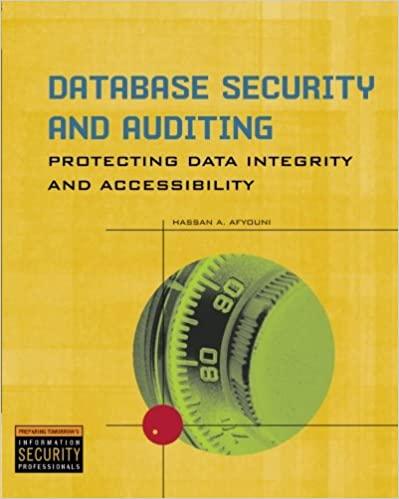Question
This is the introduction to Criminal Procedure which is the steps or process that is followed to determine the validity of numerous actions and decision
This is the introduction to Criminal Procedure which is the steps or process that is followed to determine the validity of numerous actions and decision made by Law Enforcement when encountering citizens and the investigation of those citizens in the normal course.
This process of having Law Enforcement invade the privacy of a citizen is based on numerous legal principles and rules. It is a process that encourages Law Enforcement to prevent criminal conduct and to arrest the perceived law breaker. Thus, your right to be left alone is balanced against societys interest in preventing crime and the apprehension of criminals believed to have committed a crime. Additionally, when we send Law Enforcement into the field, we recognize the danger that these brave individuals will encounter life altering risks. Thus, the system will, for officer safety allows Law Enforcement the opportunity to investigate and arrest, and will further permit the state, as the representative of the people, to prosecute the person for the charged crimes.
Below is the material for answering questions posed in the DB for criminal procedure. Besides reading the material in the book, I covered the Constitutions Bill of Rights, which sets out the fundamental rights enjoyed by people residing in the United States. The Bill of Rights encompasses many fundamental rights, such as freedom of religion, speech, press, and the right to keep arms.
The Bill of Rights also protects the citizens and others residing in this country against unwarranted intrusion into our private affairs, meaning we are protected against this intrusion in our homes, papers, and effects as set out in the Fourth Amendment. But these fundamental rights are not absolute. A police officer may enter your home if a properly issued warrant grants the officer the right to enter for a specific reason. There are other permitted warrantless intrusions.
Also, recognizing that being brought into the legal justice system is emotionally and financially draining and full of procedural and legal rules which are alien to a majority of the people, the constitution provides some safeguard, such as the right to bail, to speedy trial and the most important the right to counsel. But be aware that these constitutional rights only initially applied on the federal governments criminal investigation, arrest, and trial actions. It has been through the legal theory of INCORPORATION, that these fundamental rights have been enforced against the states using the due process clause of the 14th amendment. Not all fundamental rights have been incorporated against the states. I asked you to view two very well-done videos. The Flex Your Rights video with Billy Murphy is a good example of daily encounters between Law Enforcement and citizens. The three fact specific situations are not uncommon. The Second covers the too often forgotten right that a citizen can and has the right to remain silent. Professor Duanes treatment of the right to remain silent shows the need to be on guard when encountering Law Enforcement.
3. Having gone from a traffic stop to an encounter on the street, we move to the encounter in the last episode. What did you think about the reason for the encounter? Community safety is an important police practice. It is better to stop crime than to wait to catch the law breaker. But once the officer is in your home the officer can not and should not close his or her eyes to criminal conduct. What if the officer knew that this house had possible drug use and thus the resident was involved or knew of a possible law-breaking situation? Should Law Enforcement have to prove possession or ownership of the contraband. Should Law Enforcement be responsible if the actions taken are declared to be unconstitutional. In this episode this elderly lady is going to be evicted from public housing. What did you notice about the actors portraying the police and their explanation and arrest of this elderly resident? Do we have such a distrust of Law Enforcement that we should never let them into our homes without a warrant? Does a warrant really protect us against unwarranted police action? Finally, by community safety policing standards, should police have to show that they go to Bill Gates neighborhood as often as they go to public housing. Is this type of classification permitted legally based on crime prevention paradigm?
Step by Step Solution
There are 3 Steps involved in it
Step: 1

Get Instant Access to Expert-Tailored Solutions
See step-by-step solutions with expert insights and AI powered tools for academic success
Step: 2

Step: 3

Ace Your Homework with AI
Get the answers you need in no time with our AI-driven, step-by-step assistance
Get Started


